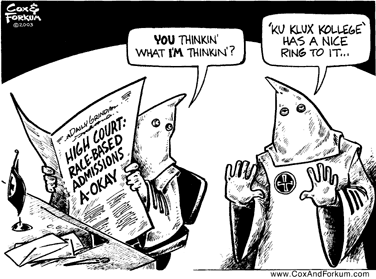
Space Shuttle launch as seen from St. Augustine, Florida
St. Augustine Record photo by DARON DEAN
Crossing the Bridge of Lions March 15, 2009, I saw the most beautiful Space Shuttle launch I had ever seen here in Florida. I thereupon reflected upon my work since the 1970s to expose governmental wrongdoing and assist ethical employee whistleblowers. We've come a long way, baby, but there is more to be done. In the words of poet Robert Frost, "I have promises to keep, and miles to go before I sleep."
That Space Shuttle has special meaning for me, because I won a precedent in the Department of Labor protecting the right of NASA contractor employees to speak their truths about contaminants in Space Shuttle cabin air -- specifically ethylene oxide.
NASA did not want to see its whistleblowers protected. We fought and won jurisdiction in that case, with the Secretary of Labor reversing a mossback old Administrative Law Judge thrice, just so one ethical Martin Marietta employee could enjoy her civil and constitutional right to a hearing.
Our Nation has a long way to go. Since that 1996 Clean Air Act whistleblower victory, another Space Shuttle has blown up, killing another seven astronauts.
As Robert Kennedy said at Berkeley, "it is not enough to allow dissent, we must demand it, for there is much to dissent from."
Scientists from around the world are coming to St. Augustine for a program on mosquito borne diseases. I am invited to speak to them on vindicating their free speech rights.
The answer to many of the world's problems is to be found in allowing scientists to practice the scientific method without fear or favor. That means no fear of governments or corporations that retaliate. It is up to all of us to speak out whenever a scientist's independence or integrity is threatened, whether by the Bush Administration's intimidation of EPA scientists concerned about pesticides or the City of Boca Raton, Florida's intimidation of wster department employees concerned about possible contamination due to low water pressure.
On November 20, 2008, the Anastasia Mosquito Control District of St. Johns County adopted a whistleblower protection policy. St. Johns County history was made when the AMCD adopted a policy to protect employee whistleblower rights to raise concerns:
AMCD POLICY 2008-01 -- PROTECTING SAFETY, HEALTH AND ENVIRONMENT AND EMPLOYEE RIGHTS TO RAISE CONCERNS
Statement of Principles: The Anastasia Mosquito Control District of St. Johns County (AMCD) encourages employees to raise concerns rather than let them fester, to ask questions and make suggestions, and to work together to solve problems and make AMCD a safe, healthy, happy workplace by respecting principles of equality, openness, transparency and a good day's work for a good day's pay.
AMCD is committed to the highest standards of moral and ethical behavior by all its employees and in all business dealings. Employees are expected to conduct AMCD business in an ethical manner and in compliance with all appropriate laws and regulations. Further, employees have a responsibility to report suspected dishonest acts and/or fraudulent activity to appropriate AMCD officials. Employees acting in good faith to report suspected dishonest acts and/or fraudulent activity ¬will be protected against retaliation for making such report.
A. Environmental, Safety and Health Protection
1. AMCD will control mosquitoes safely and prudently at the lowest feasible cost, favoring natural methods (like reducing standing water), protecting and advancing environmental, safety and health protection.
2. All employees and citizens are encouraged to ask questions, raise issues and report concerns, including concerns about environment, safety and health, accountability or other AMCD governance issues.
3. Persons raising concerns will be respected and treated with courtesy. Concerns will be discussed with respect for individual rights.
4. Employees and supervisors are empowered to report their environmental, safety and health protection concerns to the Board of AMCD and to individual Board members without fear or favor.
B. Standards
1. AMCD expects high standards in protecting employees and the public. Employees are expected to report environment, safety and health concerns and management shall act upon them expeditiously.
C. Knowingly False Allegations Not Protected
Knowingly false allegations are not protected under this policy and AMCD may discipline and terminate employees making false allegations and otherwise defend itself in the event that employees report false allegations.
D. Florida Law For Other Types of Employee Concerns
Concerns other than environmental, health and safety concerns are protected by Florida’s whistleblower law, which provides:
FLORIDA WHISTLE-BLOWER’S ACT
112.3187 Adverse action against employee for disclosing information of specified nature prohibited; employee remedy and relief.—
(1) SHORT TITLE. – Sections 112.3187 – 112.31895 may be cited as the “Whistle-blower’s Act.”
(2) LEGISLATIVE INTENT.—It is the intent of the Legislature to prevent agencies or independent contractors from taking retaliatory action against an employee who reports to an appropriate agency violations of law on the part of a public employer or independent contractor that create a substantial and specific danger to the public’s health, safety, or welfare. It is further the intent of the Legislature to prevent agencies or independent contractors from taking retaliatory action against any person who discloses information to an appropriate agency alleging improper use of governmental office, gross waste of funds, or any other abuse or gross neglect of duty on the part of an agency, public officer, or employee.
(3) DEFINITIONS.—As used in this act, unless otherwise specified, the following words or terms shall have the meanings indicated:
(a) “Agency” means any state, regional, county, local, or municipal government entity, whether executive, judicial, or legislative; any official, officer, department, division, bureau, commission, authority, or political subdivision therein; or any public school, community college, or state university.
(b) “Employee” means a person who performs services for, and under the control and direction of, or contracts with, an agency or independent contractor for wages or other remuneration.
(c) “Adverse personnel action” means the discharge, suspension, transfer, or demotion of any employee or the withholding of bonuses, the reduction in salary or benefits, or any other adverse action taken against an employee within the terms and conditions of employment by an agency or independent contractor.
(d) “Independent contractor” means a person, other than an agency, engaged in any business and who enters into a contract including a provider agreement, with an agency.
(e) “Gross mismanagement” means a continuous pattern of managerial abuses, wrongful or arbitrary and capricious actions, or fraudulent or criminal conduct which may have a substantial adverse economic impact.
(4) ACTIONS PROHIBITED.—
(a) An agency or independent contractor shall not dismiss, discipline, or take any other adverse personnel action against an employee for disclosing information pursuant to the provisions of this section.
(b) An agency or independent contractor shall not take any adverse action that affects the rights or interests of a person in retaliation for the person’s disclosure of information under this section.
(c) The provisions of this subsection shall not be applicable when an employee or person discloses information known by the employee or person to be false.
(5) NATURE OF INFORMATION DISCLOSED.—The information disclosed under this section must include:
(a) Any violation or suspected violation of any federal, state, or local law, rule, or regulation committed by an employee or agent of an agency or independent contractor which creates and presents a substantial and specific danger to the public’s health, safety, or welfare.
(b) Any act or suspected act of gross mismanagement, malfeasance, misfeasance, gross waste of public funds, suspected or actual Medicaid fraud or abuse, or gross neglect of duty committed by an employee or agent of an agency or independent contractor.
(6) TO WHOM INFORMATION DISCLOSED.—The information disclosed under this section must be disclosed to any agency or federal government entity having the authority to investigate, police, manage, or otherwise remedy the violation or act, including but not limited to, the Office of the Chief Inspector General, an agency inspector general or the employee designated as agency inspector general under s. 112.3189(1) or inspectors general under s. 20.055, the Florida Commission on Human Relations, and the whistle-blower’s hotline created under s. 112.3189. However, for disclosures concerning a local governmental entity, including any regional, county, or municipal entity, special district, community college district, or school district or any political subdivision of any of the foregoing, the information much be disclosed to a chief executive officer as defined in s. 447.203(9) or other appropriate local official.
(7) EMPLOYEES AND PERSONS PROTECTED.—This section protects employees and persons who disclose information on their own initiative in a written and signed complaint; who are requested to participate in an investigation, hearing, or other inquiry conducted by any agency or federal government entity; who refuse to participate in any adverse action prohibited by this section; or who initiate a complaint through the whistle-blower’s hotline or the hotline of the Medicaid Fraud Control Unit of the Department of Legal Affairs; or employees who file any written complaint to their supervisory officials or employees who submit a complaint to the Chief Inspector General in the Executive Office of the Governor, to the employee designated as agency inspector general under s. 112.3189(1), or to the Florida Commission on Human Relations. The provisions of this section may not be used by a person while he or she is under the care, custody, or control of the state correctional system or, after release from the care, custody, or control of the state correctional system, with respect to circumstances that occurred during any period of incarceration. No remedy or other protection under ss. 112.3189-112.31895 applies to any person who has committed or intentionally participated in committing the violation or suspected violation for which protection under ss. 112.3187-112.31895 is being sought.
(8) REMEDIES.—
(a) Any employee of or applicant for employment with any state agency, as the term “state agency” is defined in s. 216.011, who is discharged, disciplined, or subjected to other adverse personnel action, or denied employment, because he or she engaged in an activity protected by this section may file a complaint, which complaint must be made in accordance with s. 112.31895. Upon receipt of notice from the Florida Commission on Human Relations of termination of the investigation, the complainant may elect to pursue the administrative remedy available under s. 112.31895 or bring a civil action within 180 days after receipt of the notice.
(b) Within 60 days after the action prohibited by this section, any local public employee protected by this section may file a complaint with the appropriate local governmental authority, if that authority has established by ordinance an administrative procedure for handling such complaints or has contracted with the Division of Administrative Hearings under s. 120.65 to conduct hearings under this section. The administrative procedure created by ordinance must provide for the complaint to be heard by a panel of impartial persons appointed by the appropriate local governmental authority. Upon hearing the complaint, the panel must make findings of fact and conclusions of law for a final decision by the local governmental authority. Within 180 days after entry of a final decision by the local governmental authority, the public employee who filed the complaint may bring civil action in any court of competent jurisdiction. If the local governmental authority has not established an administrative procedure by ordinance or contract a local public employee may, within 180 days after the action prohibited by this section, bring a civil action in a court of competent jurisdiction. For the purpose of this paragraph, the term “local governmental authority” includes any regional, county, or municipal entity, special district, community college district, or school district or any political subdivision of any of the foregoing.
(c) Any other person protected by this section may, after exhausting all available contractual or administrative remedies, bring a civil action in any court of competent jurisdiction within 180 days after the action prohibited by this section.
(9) RELIEF.—In any action brought under this section, the relief must include the following:
(a) Reinstatement of the employee to the same position held before the adverse action was commenced, or to an equivalent position or reasonable front pay as alternative relief.
(b) Reinstatement of the employee’s full fringe benefits and seniority rights, as appropriate.
(c) Compensation, if appropriate, for lost wages, benefits, or other lost remuneration caused by the adverse action.
(d) Payment of reasonable costs, including attorney’s fees, to a substantially prevailing employee, or to the prevailing employer if the employee filed a frivolous action in bad faith.
(e) Issuance of an injunction, if appropriate, by a court of competent jurisdiction.
(f) Temporary reinstatement to the employee’s former position or to an equivalent position, pending the final outcome on the complaint, if an employee complains of being discharged in retaliation for a protected disclosure and if a court of competent jurisdiction or the Florida Commission on Human Relations, as applicable under s. 112.31895, determines that the disclosure was not made in bad faith or for a wrongful purpose or occurred after an agency’s initiation of a personnel action against the employee which includes documentation of the employee’s violation of a disciplinary standard or performance deficiency. This paragraph does not apply to an employee of a municipality.
(10) DEFENSES.—It shall be an affirmative defense to any action brought pursuant to this section that the adverse action was predicated upon grounds other than, and would have been taken absent, the employee’s or person’s exercise of rights protected by this section.
(11) EXISTING RIGHTS.—Sections 112.3187-112.31895 do not diminish the rights, privileges, or remedies of an employee under any other law or rule or under any collective bargaining agreement or employment contract; however, the election of remedies in s. 447.401 also applies to whistle-blower actions.
AMCD is about to celebrate its 60th anniversary next week and we need to celebrate its wisdom in protecting whistleblowers and urge all other governments in the world to follow its example.






































